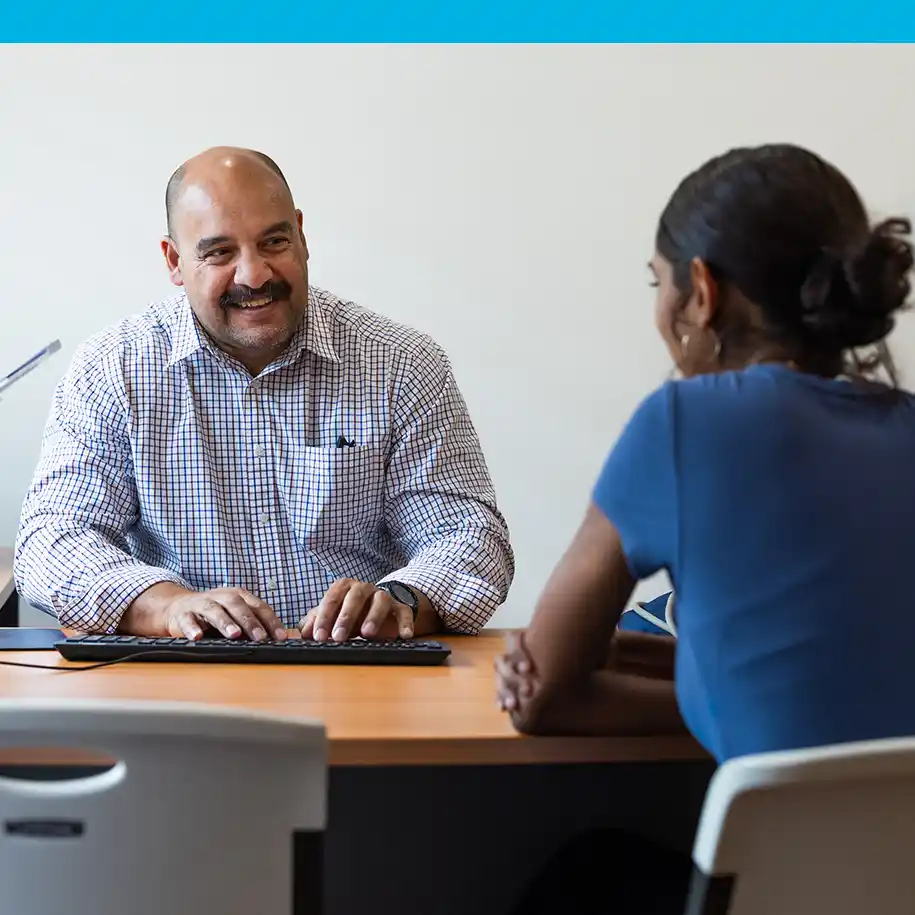
Addressing advisor burnout and staff capacity issues through coaching
New report from Tyton Partners dives into challenges facing advisors — and suggests innovative solutions
As higher education evolves to meet growing and diverse student needs, advisor burnout and turnover remain critical challenges. Yet according to the most recent Driving Toward a Degree report from Tyton Partners, in order for students to have the necessary support to thrive, it’s more important than ever for institutions to increase capacity for personal, timely guidance. InsideTrack is proud to be the anchor sponsor of Driving Toward a Degree, which proposes a combination of technological and capacity building solutions to address key challenges faced by institutions and their advising staff. In this year’s report, two different themes emerged that bear distinct implications for the outlook on advising: leveraging a combination of generative AI and human-powered solutions to help manage large caseloads, and finding ways to address and improve advisor burnout and turnover.
In a recent op-ed in Government Technology, InsideTrack president Ruth Bauer White explained how she sees the seemingly disparate approaches of human-powered and tech-enabled support coming together for the benefit of students and staff:
“True transformation happens when faculty and staff listen deeply to students and then help them develop agency, confidence and a sense of belonging. This kind of mindset shift is achievable only through the kind of genuine connection that a human coach or advisor can provide — and the rich lived experiences that they bring to the table. At the same time, it’s crucial for students to receive accurate information at the right time." - Ruth Bauer White, President, InsideTrack
That’s exactly the type of balance this Tyton report is proposing. In this blog post, we’re focusing our attention on how coaching comes into the mix, and how it can directly address the perennial and emerging challenges outlined in the Driving Toward a Degree report. Read on to learn more about how coaching can address these pain points to help expand institutional capacity to handle higher-than-ever caseloads and address advisor burnout and turnover.
Manage increasing caseloads with success coaching
Throughout the last five years of Driving Toward a Degree research, high caseloads have consistently come up as a primary challenge to improving college advising — and the reasons are easy to understand. Advisors with high caseloads meet with a smaller proportion of assigned students, conduct shorter student meetings, and are less likely to implement high-impact advising practices.
According to the report, primary-role advisors (vs. faculty advisors) contend with the highest caseloads, and those at two-year institutions typically see the highest caseloads of all. Because of this, advisors at community colleges experience greater challenges with supporting students at pivotal junctures throughout their academic journey — such as contingency planning when students fall off track and successfully adjusting to college. Less than 20% of advisors at two-year colleges report that their caseload is “always manageable.” Here’s an eye-opening look at average advisor caseloads:
4-year private colleges and universities
- 11% have 400 students or more on their roster
- 34% have 250 to 399 students
- 43% have 100 to 249 students
4-year public colleges and universities
- 21% have 400 students or more on their roster
- 37% have 250 to 399 students
- 34% have 100 to 249 students
Community colleges
- 27% have 400 students or more on their roster
- 44% have 250 to 399 students
- 24% have 100 to 249 students
Given that community colleges typically enroll more students from vulnerable populations who could benefit from increased advisor support, the negative impact of higher caseloads is likely to be felt by students at two-year institutions.
This is where direct student success coaching from InsideTrack comes in, supporting learners while providing relief for overburdened advisors.
Success coaching programs can immediately alleviate staff bandwidth
As detailed in Tyton's Driving Toward a Degree, implementing student success coaching can significantly alleviate the burden of high advisor caseloads. By offering personalized guidance and support, this approach empowers students to achieve their academic and career aspirations while fostering stronger overall outcomes.
Kristin Gurrola, senior partnership director for InsideTrack, shares her firsthand experience: “The institutions we work with are experiencing increasingly large caseloads, which inevitably causes frustration both for advisors and students. We see this across the board, especially at community colleges and minority-serving institutions and other institutions who may face budget constraints or staffing shortages,” she adds.
“When our coaches are able to come in and work alongside staff members to connect with students — whether they are prospective, enrolled or looking to return to school – we're able to help alleviate some of the bandwidth constraints, and we're able to give students a deep level of support. A critical component of these coaching programs includes training the coaches to become an extension of the institution itself, so students receive a continuity of care, and so there is no confusion between student support efforts.”
“When our coaches are able to come in and work alongside staff members to connect with students — whether they are prospective, enrolled or looking to return to school – we're able to help alleviate some of the bandwidth constraints, and we're able to give students a deep level of support." - Kristin Gurrola, Senior Partnership Director, InsideTrack
Reimagining advising: Illinois Central College’s coaching-centric approach transforms student support
So what does that look like in action? Take the case of Illinois Central College (ICC), a multi-campus community college serving one out of every four graduating high school seniors in the region. Reading student surveys, it was clear the school’s student support needed a change.
The college created a long-term plan, secured Title III federal grant funding, and partnered with InsideTrack to holistically redesign their advising practices, placing coaching at the center of their model. Student-facing ICC staff received training on InsideTrack’s research-proven methodology, giving them the tools to expand their capabilities, improve student outcomes and ultimately redesign their academic advising services — helping them increase the consistency and quality of service across all advisors. On the flip side, leaning into the coaching model enabled advisors to decrease their dependence on face-to-face, on-campus appointments, instead using technology (phone, email, text, video) to connect with students in ways that work for them.
While ICC was going through this extensive transformation, they still had to manage their caseloads and support enrollment efforts. So they employed InsideTrack coaches to re-enroll stopped-out students and alleviate some of the burden on staff. According to a seasoned InsideTrack coach who worked with ICC on re-enrollment, “It was wonderful to be able to make a warm transfer and seamlessly hand-off the learners I worked with to an ICC student success advisor who has been trained in our methodology, ready to help those students take the next step toward re-enrolling.”
Amy Daxenbichler, Dean of Students at ICC, cites three key ways that helped pave the path to success for ICC as they incorporated both direct coaching and coaching development and training for staff to create a mindset shift in the way the school addresses advising.
- Be smart about the data you’re providing to the coaches, allowing them to contact and build relationships with the right students at the right time.
- Commit to a campus-wide change, one that involves leadership and staff, budgets, and clearly defined goals and objectives.
- Provide a consistency of care so that any staff member who has student-facing interactions has been trained and will provide the same high level of care.
Going all-in on coaching allowed ICC advisors to expand their bandwidth, handing off some students to InsideTrack coaches who served as an extension of the college, while building their own internal capacity at the same time.
Prevent employee burnout with capacity building
As spelled out in the latest Tyton report, advisor turnover now represents a significant and growing challenge for institutions across the country. Factors such as emotional exhaustion and burnout are especially concerning for primary advisors with high caseloads, with one-fifth of primary role advisors with caseloads of greater than 400 saying they are unlikely to continue their roles over the next five years. For the past three years of the Driving Toward a Degree report, advisor retention and turnover has steadily increased in the rankings for challenges to improving advising. Knowing how important institutional knowledge is for someone working in higher ed, these statistics on tenure for primary role advisors are cause for concern:
4-year private colleges and universities
- 31% have worked at their institution 2 years or less
- 35% have worked there 2 to 5 years
- 20% have worked there 5 to 10 years
4-year public colleges and universities
- 34% have worked at their institution 2 years or less
- 31% have worked there 2 to 5 years
- 19% have worked there 5 to 10 years
Community colleges
- 32% have worked at their institution 2 years or less
- 34% have worked there 2 to 5 years
- 21% have worked there 5 to 10 years
Every time an advisor leaves, their connections with staff, faculty and students — as well as their institutional knowledge — walks out the door with them. The report notes that in recent years, advisor turnover has become a top barrier to improving advising. New advisors start off with lower caseloads than seasoned advisors (an average of 246 for new advisors vs. 303 for seasoned advisors), increasing overall strain on the advising team.
But that’s just part of the story. Prior research from NACADA: The Global Community for Academic Advising suggests that emotional exhaustion and burnout are a real problem for academic advisors, with 40% of them saying they feel burned out from their work ranging from at least once a week to every day. But the future doesn’t have to look so dim. The Tyton report suggests that technology, such as generative AI, along with professional development, could serve as solutions to enhance advisor efficiency and facilitate collaboration across student supports.
Incorporating coaching development and training to help retain staff — and students
As institutions introduce AI and other technology solutions to increase capacity and bandwidth, they can also consider training and professional development as a way to help advisors achieve higher levels of impact in their student interactions, making sure to balance their tech-enabled solutions with human-centered support.
As noted in the Tyton report, “Institutions can support academic advisors, particularly those with less tenure, by providing continuous training and professional development opportunities, such as capacity building. Capacity building helps academic advisors deepen their understanding of academic policies, curriculum requirements, and student support resources, as well as develop advisors’ interpersonal and communication skills to more quickly and effectively build relationships with students. Importantly, professional development can help reduce the risk of burnout by introducing advisors to frameworks, tools, and strategies to prevent burnout.”
At InsideTrack, we view coaching development and training as a way to create both immediate results and lasting improvement. We train leaders and staff to use our evidence-based coaching methodology, helping institutional teams become more proactive, learning-centered and holistic in their work. Coaching development and training services can increase capacity and job satisfaction while reducing turnover — for advisors as well as other staff members and institutional leaders.
As someone who works with college and university partners everyday, Kristin Gurrola is all too aware of the challenges. “Advisor and staff burnout is a very real challenge at many of the institutions we work with. As one of our partners recently said, ‘We suffer burnout because we’re giving 110% effort 125% of the time.’ So when we think about partnering with organizations to truly embed coaching into their advising and student support practices, we have to keep in mind that ‘initiative fatigue’ is very real,” she says.
“That means we have to work with practitioners, managers and leaders to intentionally design programs that will actually stick. When the institutions are ultimately able to prioritize this training to equip their staff with a holistic coaching methodology, staff members report being able to advise students more effectively and efficiently, while also finding more satisfaction in the job they do every day.”
“That means we have to work with practitioners, managers and leaders to intentionally design programs that will actually stick. When the institutions are ultimately able to prioritize this training to equip their staff with a holistic coaching methodology, staff members report being able to advise students more effectively and efficiently, while also finding more satisfaction in the job they do every day.” - Kristin Gurrola, Senior Partnership Director, InsideTrack
Empowering advisors: Building a coaching culture helps students and staff
So how, exactly, does coaching development and training work? Johnson C Smith University (JCSU) in Charlotte, North Carolina, is the top-ranked private HBCU in the state, serving more than 1,100 students. Leaders were looking for ways to strengthen student belonging and support, with a long-term goal of making the university a model for holistic, coordinated care — and in doing so, help to alleviate advisor burnout.
As a UNCF member institution, JCSU initially participated in a network re-enrollment coaching initiative that gave them a sense of the power of coaching. Wanting to take their impact to the next level, JCSU embarked on two transformative student support initiatives that would help them reach their goals — embedding InsideTrack’s coaching methodology into student-facing staff roles and building a student support app platform called BullsNav. Using the BullsNav app, students can access a variety of campus resources and support, while at the same time, freeing up more time for advisors to go deeper with student conversations and support. It’s a win-win that combines technology with personalized human-centered support.
Nichole Patterson, a success coach on campus at JCSU, explains how receiving InsideTrack training has made a difference in her work. “Before going through this model, my approach would have been to just tell the student, ‘you need to do A, B, C and D, and in that order’. Now, I will listen to the student, ask them, ‘What have you tried already? and ask them, ‘What is your timeline for getting to your goal?’ Then I allow the student to talk through what success looks like for them – not for me.”
She adds, “I think that it's helped me to fit into the model that the university wants, which is for every student to receive a standard of care. Because we've all received that training, I feel confident that I am providing that standard of care. And when I engage with my colleagues, we're talking the same language and we can strategize together on how to best assist a student.”
It’s clear how coaching can help advisors lean into the purpose they find in their jobs, helping — and watching — their students successfully work toward their goals. She continues, “People are coming here to make an impact on our society, and I am a change agent. I have a small part to play in a big picture of success. That's one thing that keeps me connected — that we are all in this together. For me, if I can impart something to someone or turn the light bulb on for them, that is a reward for me is to see that while we started here, now we're here and we're moving forward.”
Through actionable insights, firsthand case studies and downloadable tools, InsideTrack’s Empowering Teams, Transforming Outcomes: A guide to building a holistic in-house student support program provides a great resource for institutions looking to build in-house capacity.
A comprehensive approach to student support
By strategically integrating coaching into their student support strategies, institutions can effectively address the twin challenges of advisor burnout and overwhelming caseloads. As highlighted in the Driving Toward a Degree report from Tyton Partners, coaching offers a powerful solution, empowering students to take ownership of their academic journeys while alleviating the pressure on advising staff. By combining coaching with technological advancements, institutions can create a more sustainable and effective advising ecosystem, ensuring that students receive the personalized support they need to thrive and institutional advising staff are able to spend more time working directly with students.
Ready to learn more about how InsideTrack’s holistic coaching solutions can help your students, staff and institution?
Coaching solutions proven to advance all learners
Whether you’re looking to help students persist through completion or to improve career outcomes for job seekers and employees, our holistic coaching solutions can help you achieve meaningful outcomes.



